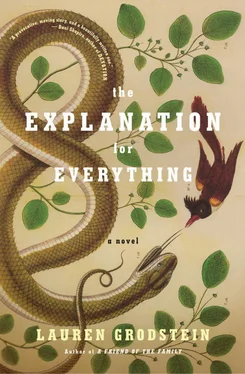“You know—that test. For graduate school. Forget it, you wouldn’t understand.”
Mrs. Lim sighed. She would understand, of course, but it helped Anita to shut her out and concentrate if she thought her mother was just a storekeeper, nobody she had to pay too much attention to. Then she thought, don’t be silly, don’t be sorry for yourself. Think here of everything you have. A sweet son, a brilliant daughter, even though it might have been nicer to have it the other way around.
Of course Anita could have majored in anything—English or anthropology, French or chemistry—but after a class with Stephen Pinker of linguistics fame, she chose to study linguistics, specifically the way that the evolution and dispersal of various language patterns mimicked biological evolutionary trends. Pinker had suggested to her that she continue her studies at Princeton, which had an excellent evolutionary biology program, helmed by the brilliant Henry Rosenblum, the author of The Homo Sapiens’ Backbone and Religion’s Dangerous Lie. This sounded like a good plan to Anita, who was beginning to formulate a plan for her life: school, more school, a PhD, and a tenured job at a school. In her spare time she would continue to play the cello and tennis.
She met Rosenblum for the first time at a conference at MIT’s Whitehead Institute, where she was presenting a paper she’d coauthored with one of her lesser professors. He introduced himself after her presentation, told her he’d heard a lot about her, looked forward to working with her in the fall. She should look for an official acceptance letter in the mail in the next few weeks. “That’s it?” Anita asked him. She was startled by Rosenblum’s enthusiasm; she had taken him for a cheerfully drunk old man when he’d first approached her. He was tall, with a large belly and ears full of protruding white hairs; the pictures she’d seen of him had clearly been taken twenty years earlier.
“That’s it,” Rosenblum said. “You’ll be working closely with me. I look forward to it.”
“So do I,” Anita said, startled and a bit underwhelmed.
“Princeton!” Mrs. Lim’s mother was dead in Pusan at this point but she could feel her spirit smiling down at her, whispering praise.
“I barely even had to apply,” Anita said. Even she sounded impressed with herself.
“And you’ll be close again! New Jersey!”
“Yes,” Anita said, and suddenly that distracted sound was back in her voice. “I guess I will.”
Eddie, at this point, was at seminary in upstate New York, studying to be a pastor, and was dating a nice girl and collecting some nice friends, including a roommate, Charles, whom he spoke of fondly and frequently. Charles was from Los Angeles, his family originally from Seoul, and everything he did seemed to be haloed with luck and success. Charles was the smartest in the class, Charles spoke three languages fluently, Charles delivered sermons with such grace that he could make their weathered old teachers weep with newfound devotion. The Lims met Charles on their trips to visit Eddie upstate and were impressed by him, if a little put off by his fierce-eyed determined belief in not just the Lord, but himself. He offered to pay for dinner for everyone when they went out, as though the Lims wouldn’t be happy to pay, or as if they couldn’t.
As for Anita, she lived in a tiny apartment in Princeton, across from a record store, one room with a hot plate and a bathroom that even a tiny girl like her could barely squeeze into. No closet. One window. The Lims offered to help her with something better but Anita declined, said she was happy there, and anyway she spent so much time in Rosenblum’s lab she was rarely home anyway. Her research was incomprehensible to her parents, although this new, satisfied Anita—as satisfied as they’d ever seen her, although still distracted, and more focused than ever on academic success—this new PhD-candidate daughter did try to explain to them what she was doing. Her research worried them because it seemed to be less about language at this point and more about evolution, strict Darwinian evolution, which contradicted everything they knew from church and everything they believed in their hearts. But they knew that they had let Anita go her own way all those years ago when they allowed her to play cello instead of go to church, study chemistry instead of read the Bible, so whose fault was it, really, that she was now studying Darwinian evolution? Could they blame anyone but themselves?
And surely devout Eddie was making up for whatever lapses they’d allowed in Anita.
They met this Rosenblum several times in Princeton, and he seemed to be a nice enough man (“But so foul-mouthed!”) who praised Anita constantly and without moderation. “She’s doing brilliant work, Mrs. Lim. I’ve honestly never met a student like her in my life. Her theory on the viral origins of life—has she explained it to you? In our field this is groundbreaking stuff. And for someone like her, doesn’t even have her PhD yet—for someone like her to be publishing these kinds of papers, it’s really unbelievable. You must be very proud.”
On their drive back to Brooklyn, Mrs. Lim noticed how worried her husband looked. “That professor,” he said, “what do you think he wants with her?”
“No, no,” Mrs. Lim said, glad that her husband had articulated what they were both worried about so that she could reassure him, and thus herself. “He really just thinks she’s very smart, that’s all. He doesn’t want anything else.”
“But why is he always around? Every time we visit, there he is.”
“She works in his lab,” Mrs. Lim said. “They have a very close professional relationship.”
“What if he takes advantage of her?” he said. “She’s still so innocent.”
This was something Mrs. Lim wondered about too, although she knew better than to bring it up with her daughter (and here too she imagined those American mothers and their daughters, eating their lunches, talking about boyfriends)—why exactly was this Rosenblum so high on their Anita? Why that possessed look in his eye when he told them how brilliant she was?
“No, Mom, you don’t understand. We’re doing research together. If anything it’s an intellectual affair, not a sexual one. I mean, if it helps you to think of it like that.”
This didn’t help Mrs. Lim at all, not that it mattered much. Anita was a grown woman now, and her life was her own. She could study Darwinian evolution, have an intellectual affair with her professor, live in a room like the room she herself had once shared with three friends in Pusan, before she met her husband, before she followed him to America, before she worked calluses on her fingers to give her children something more.
In April Anita won another award, something big and important with money attached. Evidently this was the first time a person without a PhD had won this particular award, and she and Rosenblum traveled together to London to receive it. Mrs. Lim wanted to meet them at the airport on their return—ever since she had moved to this country, bewildered, exhausted, and was met by representatives of the Bethany church, Mrs. Lim had been a firm believer in meeting people at airports. But Anita, of course, said no. A car service would be provided for them. They would be ferried right back to Princeton. Why would she even want to go to the airport on the middle of a Tuesday? Didn’t she have to work? And there it was, the sneer in Anita’s voice, and Mrs. Lim, when she hung up the phone, didn’t wish for another daughter this time nor lament the daughter she had. Instead, she took down the Harvard bumper sticker, and then she went back to work.
In May Anita passed her orals.
In June Eddie was married.
Читать дальше












